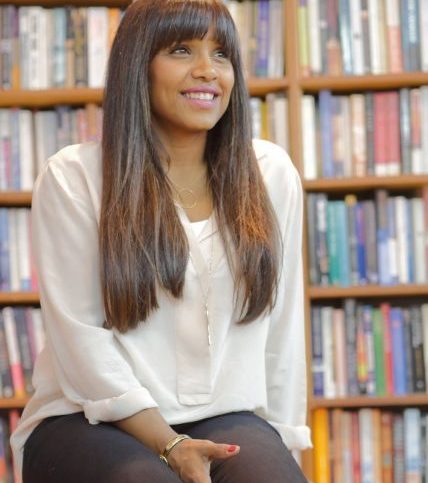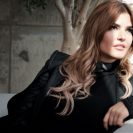Just last year, in April of 2015, three brilliant minds – Abdullah Al-Khulaifah, who is studying to be a clinical psychologist, Mamuna Sarwar – an educator – and Fatma Al-Hamad, an architect – got together to collectively give birth to Word of Mouth Kuwait, a forum for poets to publicly recite their poems in their language of choice. In less than a year, WOM has organized three successful poetry events. Though poetry has always been a part of our culture, the scene itself – which appeared to be a burgeoning underground movement in the last couple of decades – has only recently, and finally, bubbled to the surface. Many people are noticing a shift and the timing was right for WOM to pave its way into the hearts and minds of those living in K-city. The international vibe of both the poets and the audience brings about a sense of unity, which is palpably experienced at a WOM event. The wizards of WOM are surely preparing for many events ahead.
In the meantime, I present to you the two lovely ladies who are currently holding the WOM fort: Mamuna and Fatma. Their co-creator, Abdullah, has recently moved to Scotland, but his presence is felt here.
Your first show was an instantaneous hit. It must have even exceeded your own expectations! Tell us more about your debut WOM event.
MS: Our debut WOM event was an exciting experience. The concept of WOM as a platform for multilingual performances had only been conceptualized a month prior, and there we were, holding our very first event. It was a daunting task, and one that required all of our energy. We were all putting in 5-6 days per week for this event, in addition to our daily jobs. Once preparation was complete – and we had figured out the logistics including the venue, seating, social media promotion, programs, poets performing et cetera – all that remained was executing the event and making sure that it would run in a smooth manner. I can honestly say I probably had heart palpitations throughout most of that evening, just because I, along with the other WOM members wanted it to be received well. We were not worried about WOM gaining popularity; rather we wanted to showcase quality work, as our names were attached to the WOM label. When the night finally ended, we were all very proud of what we had accomplished, and we received wonderful feedback. This gave us the motivation to continue expanding WOM and have more consistent events.
FH: The turn-out at our first event was actually a surprise to us – a pleasant one. We didn’t expect that kind of response to poetry. Apparently, people want to express themselves and most of all people want someone to express for them.
In the last poetry event that you organized, you were part of Nuqat’s insightful “Copy and Paste Syndrome”. There is a very thin line between inspiration and imitation. What is your take on the matter at hand?
FH: A poet must have a style in writing that has to be his/her own style and not copied from someone else. Poetry has a lot to do with writing from experience; many can go through the same experiences but what differs is the point of view of each and every one of us. A smart writer, a good writer – in my opinion – makes us feel and understand this experience. Mark Twain said, “Write what you know.” There is beauty in the face of truth; it can be recognized and sensed, even under the best disguise.
These days, poets are no longer confined to structure and rhyme. Even a two-lined billboard advertisement can take our breath away. So what makes a poet stand out, in your opinion?
MS: For me, I really enjoy poetry that is raw, that evokes some type of emotion; that displays a person’s insecurities, failures and fears. I think nowadays we are too caught up in presenting the world with a “picture-perfect” image of how our lives should be. Very few people want to open themselves up and reveal their vulnerabilities. I think it is amazing when a person can go through adversity or trying times, and want to share that with the world. It gives hope to so many who may be in a similar position. Being vulnerable is what I consider great poetry. I’m not talking about the cliché I’ve-had-my-heart-broken-and-want-to-share-it-with-the-universe type of vulnerability, but more so the vulnerability of people who have fallen so many times, bloody, with scraped knees and all, but continue to lift themselves up and rise above. To share that experience with the world is a beautiful thing.
FH: I think confinement can be both good and bad for poetry. When it comes to the basic rules, I do think we have to apply them at least. It can be as simple as ‘it sounds right’; but the main thing that makes a poet stand out from the others is his or her style. I think poetry is an art form that has to come from within, naturally.
You and Fatma are both poets in your own right. Has mingling with fellow poets on a regular basis changed your perception of verse?
MS: To be quite honest, I was never one to stick with the traditional structure and rhythm of poetry, and I grew up following poets who varied in writing style. Basically, meeting other poets has not changed my perception of verse; it has only strengthened my belief that poetry can come in many forms and styles and does not need to be constricted. I’ve been fortunate enough to encounter many talented poets and, with each encounter, I am able to take a little bit here and there. It has provided inspiration for me to continue on with my writing journey. One thing I must also add is that I do not really consider myself a poet, as my work is very much still developing. I would have to say that I am a premature writer working her way up! [laughs]
FH: It definitely helps. It can be another source of inspiration; you cannot identify your own style if you don’t see the way others write. There is nothing such as ‘the best poet’. It is a matter of taste, and the more you get to know poets the more you will acknowledge that taste.
The crowd at your events is eclectic. What is about poetry that is so magnetic?
MS: I feel like poetry is a magical art form. It alters our world, it changes our perception of ourselves, and it challenges us to explore bigger possibilities. I know that when I read a great poem, it leaves me feeling a wealth of emotions, and I genuinely enjoy the journey I was taken on. It’s quite fascinating when you can read a poet’s work, such as Rumi or Khalil Gibran, and be taken on a rollercoaster of emotions, from feeling melancholic to angry, excited to joyful. Poetry has a wonderful way of doing that. It has a great way of providing an escape, but on the flip side, it can also be politically and socially conscious.
FH: We do not only love the crowd; it is the response and the engagement that we cherish and strive to keep in every event. We aim for variety in our events; in terms of language and topic, we cannot bore the crowd with the same topics and the same style. A reaction – a positive reaction – is what we aim to get from our audience; and one more important thing: we want them to come back.
WOM is almost a year old now. You’re growing fast! So what’s next?
MS: There are a lot of changes that have occurred since WOM came into fruition a year ago. One of our partners moved to Scotland to pursue his Master’s degree, and I, unfortunately, will also be returning to my home and permanent place of residence, Canada, to continue my career in education. My hope is that WOM continues to thrive. For the future, we aspire to hold WOM events throughout the Middle East, and even possibly North America. We may do more collaborative work, and expand our audience. I have large ambitions, as I often tend to think on a large scale – a habit I developed as a child, but I am aware that a lot more work needs to be put in for us to reach that level of success. I’m definitely eager to see where WOM takes us!
FH: To be frank, we started this simply because we wanted a place for poets to come together and express themselves. We are ecstatic that there is a niche here for that, but we did not expect this feedback. Also, we would rather grow slowly and succeed, than grow rapidly and fail. We aim to cater to more events, and ‘consistency’ – as Mamuna always reminds us – is very important. We always want to maintain the best standards for our audience and poets. We aim to give back to society – Kuwait, first and foremost – and hopefully internationally, in the future.
For more information check out @wordofmouthkw on Instagram or Facebook: WordOfMouthKW.









